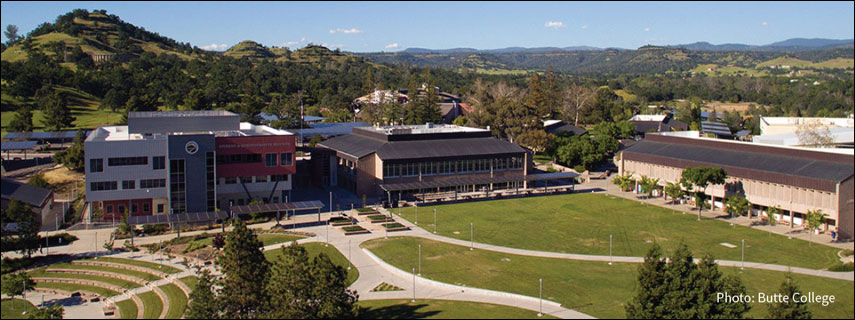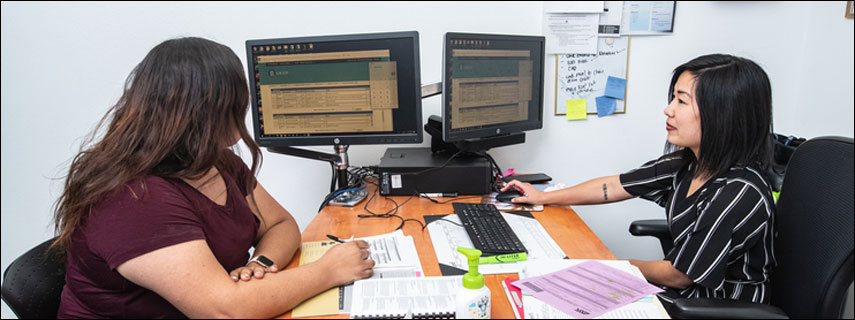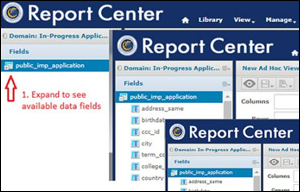- Details
- Written by Crista Souza
- Category: Uncategorised
- Hits: 17495
How To Adopt

Get Started with Tech Center Product Solutions in 2 Easy Steps
The California Community Colleges Chancellor’s Office and the Technology Center have teamed up to provide the California Community Colleges (CCC) with a suite of no-cost software solutions geared toward improving student outcomes, increasing college efficiency, and strengthening the CCC as a whole. Deployment services are included.
Follow these easy steps to adopt Technology Center solutions.
1. Learn about the solutions available to your college:
Learn about all of the product solutions that are provided by the Chancellor’s Office and Technology Center at no cost to the college, including deployment services. Review Highlights of Technology Center offerings. Or click on the Projects menu above to learn more about our products.
2. Contact your College Experience Manager (CEM) to get started:
Your Technology Center College Experience Manager (CEM) will help you learn more, and get you started. If you do not know your CEM, please refer to our listing of CEMs by college for specific contact information, or simply send an email to This email address is being protected from spambots. You need JavaScript enabled to view it. to get acquainted.
Contact Us
CCC Technology Center Enabling Services
College Experience Managers
This email address is being protected from spambots. You need JavaScript enabled to view it.
- Details
- Written by Crista Souza
- Category: Uncategorised
- Hits: 12733
Policy
 The California Community Colleges has a number of data projects and technology infrastructure initiatives with substantial assets that create a wealth of information that informs decision-making and empowers applications.
The California Community Colleges has a number of data projects and technology infrastructure initiatives with substantial assets that create a wealth of information that informs decision-making and empowers applications.
The CCC Technology Center facilitates systemwide governance committees to manage strategic development of these projects and identify integration opportunities externally and throughout the system.
- Details
- Written by Crista Souza
- Category: Uncategorised
- Hits: 15197
Data Governance
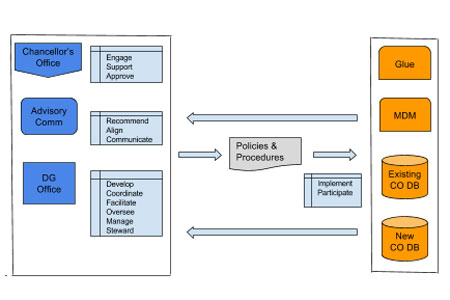 As data-driven decisions increasingly become the expectation, it is critical the right data is being captured and its use maximized. A systemwide data governance committee is being formed to address strategic master data management of the numerous, substantial data projects within the California Community Colleges.
As data-driven decisions increasingly become the expectation, it is critical the right data is being captured and its use maximized. A systemwide data governance committee is being formed to address strategic master data management of the numerous, substantial data projects within the California Community Colleges.
The goals and objectives are as follows:
- Establish a systemwide Data Governance Advisory Committee (DGAC) to recommend policy and oversee execution through a Data Governance Office (DGO)
- Establish and operate a Data Governance Office (DGO) to operationalize policy across systemwide data sources
- Fund and track implementation projects to align current and future data initiatives with data governance policies and procedures.
Under direction of the Chancellor’s Office the California Community Colleges Technology Center will work cooperatively with the advisory committee to operate a data governance office to achieve the goals of the initiatives. The CCC Technology Center will coordinate efforts to plan and execute the projects.
- Engage and promote inner-office and inter-office cooperation
- Provide financial support for the initiative and projects
- Provide final authority and approval of policies and procedures
Data Governance Advisory Committee
The DGAC, composed of appropriate stakeholders from appropriate systemwide constituencies, will review and provide guidance and recommendations to the Chancellor’s Office for directing the initiative and decision-making specifically by:
- Review and recommend a strategy for data governance
- Provide sponsorship for the community and data governance adoption
- Review and recommend a process for decision-making over data governance policies and procedures
- Review and recommend a set of approved policies, standards, requirements and definitions
- Review and recommend a Governance Management Plan for the Data Governance Office
Data Governance Office
The DGO will have responsibility to coordinate and facilitate data governance for individual projects specifically by:
- Draft proposals for data governance efforts
- Follow recommendations of the Advisory Committee to coordinate and execute proposals
- Drive the documentation, approval and operationalization of policies, standards and processes
- Facilitate ongoing communication to stakeholders across the CCC system
- Manage alignment with data owners, e.g. MIS, college CTOs, EdResults, etc.
- Oversee the activities of the data stewards
- Support data quality efforts including the definition of business rules
- Work with the Master Data Management project to implement the Data Governance rules and standards in code.
- Work with internal auditors to enforce compliance with policies, standards and regulations
The value of the Data Governance Initiative will be realized through the participation in developing and adoption of policies and procedures by stakeholders in existing and new data projects specifically by:
- Participate in committees and sub-committees when invited
- Share and consult with the DGAC and DGO
- Adopt policies and procedures through implementation projects
- Details
- Written by Crista Souza
- Category: Uncategorised
- Hits: 15233
Systemwide Technology Governance
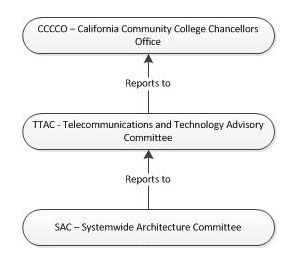 The California Community Colleges Technology Center facilitates two systemwide technology governance committees:
The California Community Colleges Technology Center facilitates two systemwide technology governance committees:
Telecommunications and Technology Advisory Committee
The Telecommunications and Technology Advisory Committee (TTAC) researches technology trends and recommends the direction for technology infrastructure initiatives within the California Community Colleges. The committee develops System Technology Plans, Budget Change Proposals, and is responsible for approval of Technology Standards.
TTAC has three co-chairs:
- A representative of the Academic Senate for California Community Colleges,
- A representative of the Chief Executive Officers of the California Community Colleges Board,
- And the Vice Chancellor of the Digital Innovation and Infrastructure Division, California Community Colleges Chancellor's Office.
Systemwide Architecture Committee
The Systemwide Architecture Committee (SAC) is a sub-committee of TTAC that provides technical expertise for planning the development and growth of the systemwide IT infrastructure for the California Community Colleges. Broad objectives for the IT infrastructure are to facilitate student interaction with the community college system, to enhance collaboration among the community colleges and other elements of the California educational system, and to provide services in a cost-effective manner.
SAC has three co-chairs:
- The California Community Colleges Chancellor's Office Enterprise Architecture Lead,
- The California Community Colleges Chancellor's Office Information Security Lead,
- And the Executive Director of the California Community Colleges Technology Center.
- Details
- Written by Crista Souza
- Category: Uncategorised
- Hits: 12237
Project Management Office
 The California Community Colleges Technology Center Project Management Office facilitates processes, communication, reporting, and transparency across the technology projects funded by the Digital Innovation & Infrastructure Division. This promotes fact-based decision making on programs, projects and initiatives, improving overall organizational results.
The California Community Colleges Technology Center Project Management Office facilitates processes, communication, reporting, and transparency across the technology projects funded by the Digital Innovation & Infrastructure Division. This promotes fact-based decision making on programs, projects and initiatives, improving overall organizational results.
The Project Management Office provides the following services:
- Manages processes by which programs and projects are defined, prioritized, budgeted, scheduled, staffed, and executed.
- Facilitates identification of Key Performance Indicators (KPIs) and facilitates processes by which program and project status and health is measured.
- Provides reporting for all projects, programs and initiatives within Technology Center and facilitates fact-based decision making based on project data with stakeholders.
- Provides organizational liaison and central point of contact for all initiatives coming into the Technology Center.
- Develops, produces and distributes Project Management Standards for implementation by statewide technology initiatives.
- Provides education and advice to other systemwide projects and colleges on Project Management Office standards and practices.
The Project Management Office provides the following outcomes:
- Improved project quantification, budgeting, tracking, and predictability through introduction of PM best practices.
- Improved team velocity through appropriate planning, removal of roadblocks, and active risk management and mitigation.
- Improved accountability, decision making, and interventions through development, monitoring, and reporting of KPIs.
- Improved cross-organizational collaboration.
- Improved quality of project results
Tech Center Highlights
We bring systemwide enabling technologies to our colleges.
Adopt Our Tech
From connectivity to student services and educational technology.
Connecting Colleges
Gigabit fiber optic network for all of our colleges.
Information Security
Logging, monitoring, and no-cost tools to protect students and educators.
Accessibility
Training and resources to make tech accessible to users with disabilities.
Events
Upcoming CCC Technology Center workshops and webinars.
About the Technology Center
The California Community Colleges Technology Center, hosted by Butte College, facilitates and coordinates the work of systemwide technology. Our 25-year history of collaboration with the Chancellor’s Office and community colleges throughout the state has resulted in great strides forward for the system in areas including federated identity, application architecture, networking, and student services.
We operate under the Gartner model of “Run, Grow, Transform” to simplify our portfolio of services and prioritize resources in support of ongoing operations, the next phase of growth, and longer term transformative innovation.

